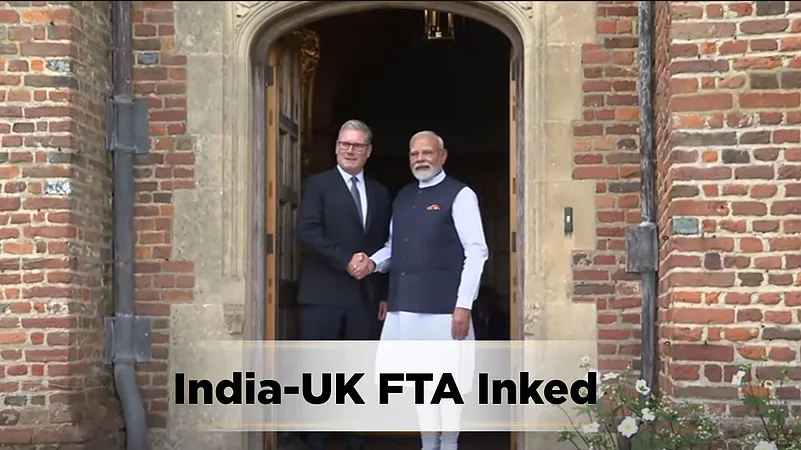India UK Free Trade Agreement: India and the United Kingdom (UK) signed the much-awaited free trade agreement (FTA) on July 24, 2025. The deal, formalised during Prime Minister Narendra Modi’s official visit to the UK, is expected to double bilateral trade from the current $60 billion to $120 billion by 2030.
The agreement was signed following a high-level meeting between Prime Minister Modi and British Prime Minister Keir Starmer at the historic Chequers Estate.
"Today marks a historic day in our relations... After years of hard work, we have signed the Comprehensive Economic and Trade Agreement,” said Prime Minister Modi while announcing the FTA.
"A landmark deal with India means jobs, investment and growth here in the UK. It creates thousands of British jobs, unlocks new opportunities for businesses and puts money in the pockets of working people. That's our Plan for Change in action," Stammer wrote on X.
The India-UK free trade agreement will remove import duties on a wide range of Indian exports to the UK, including agricultural products, textiles, seafood, engineering goods, pharmaceuticals, medical devices, leather goods, and chemicals.
According to mygov.in, the FTA opens up the UK’s $37.5 billion agricultural market to Indian farmers, with new export opportunities for jackfruit, millets, and organic herbs. The agreement protects India’s sensitive sectors like dairy, apples, and edible oils, with no tariff cuts in these areas. The deal also includes legal protection for India’s traditional farming knowledge under intellectual property rights.
For India’s seafood industry, exports of shrimp, tuna, fishmeal, and feed to the UK will now be duty-free, giving Indian seafood exporters access to a $5.4 billion market. This is expected to directly help fisherfolk in states such as Andhra Pradesh, Odisha, Kerala, Tamil Nadu, and Gujarat. Officials estimate that up to 28 million livelihoods could gain from the tariff-free seafood corridor.
The FTA will also make it easier for India’s micro, small and medium enterprises (MSMEs) to access trade finance, skill development, and global business networks. Products with GI tags and other intellectual property protections will receive greater recognition in the UK. Leather and footwear exports could exceed $900 million, benefiting small manufacturers and artisans. Cities like Tirupur and Kanpur are also likely to see more jobs and rising export demand.
Amit Baid, Head of Tax at BTG Advaya, said the India-UK trade deal opens a “two-way corridor of opportunity” at a time when global supply chains are undergoing major shifts. “Scotch whisky and luxury cars will enter India more affordably, while Indian textiles, seafood, and engineering goods gain ground in the UK,” he noted. However, he added, “The real success will depend on how effectively both sides convert this market access into meaningful outcomes for jobs, supply chains, and investors.”










